Sports
Olympic Games 2024 live updates: Simone Biles leads in gymnastics qualifiers at Paris Olympics
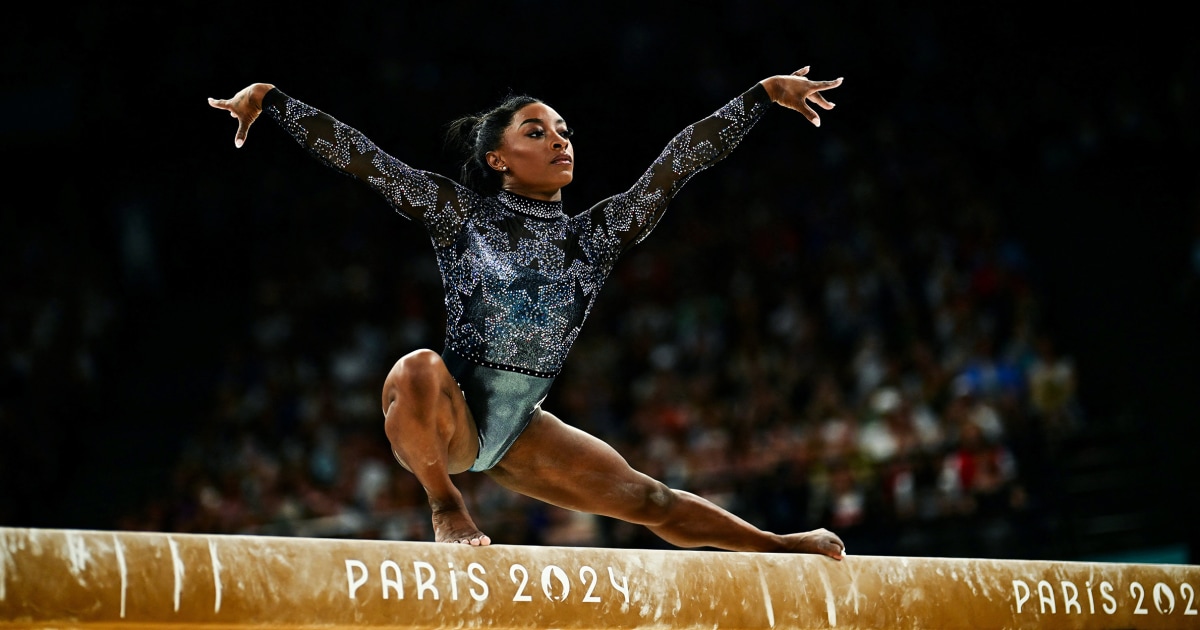
Leon Marchand sends crowd wild, eases through 400m Individual Medley heats
French poster boy Leon Marchand thrilled the crowds at the La Defense Arena as he convincingly qualified for the final of the men’s 400m Individual Medley this morning.
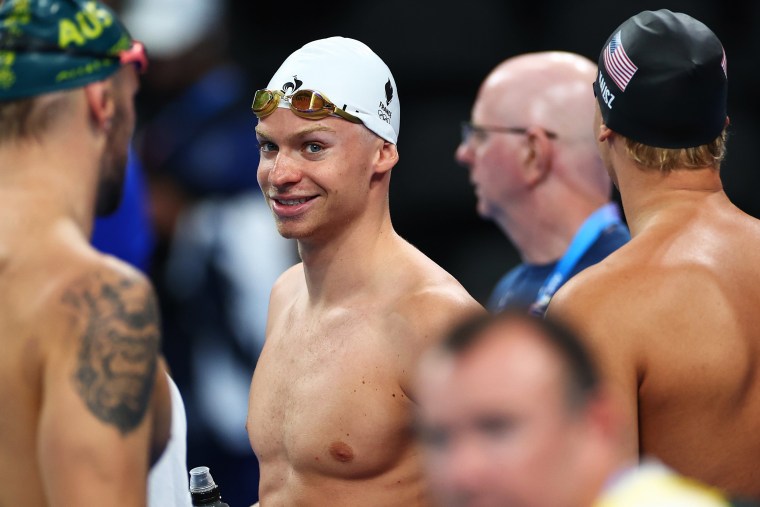
Marchand wasn’t near his world-record pace, but with the crowd at fever pitch, the 22-year-old — he’s coached by Michael Phelps’s long-time coach Bob Bowman at Arizona State — still comfortably qualified fastest for tonight’s final.
France hasn’t won gold in the pool since 2012, but the dominant Marchand, one of the biggest French stars at these Games, looks set to end that drought in Paris. The swimmer has been tearing up the record books over the last few years and is a gold medal favorite in four events.
The 400m medley sees swimmers swim 100m in each of the four recognized Olympic swimming strokes: butterfly, backstroke, breaststroke and freestyle. Team USA’s Chase Kalisz, the defending gold medalist in this event, missed out on making the final, though America will be represented by Carson Foster, who qualified fourth fastest.
Eight years ago Kristen Faulkner didn’t know how to clip into a bike — now she’s an Olympic cyclist
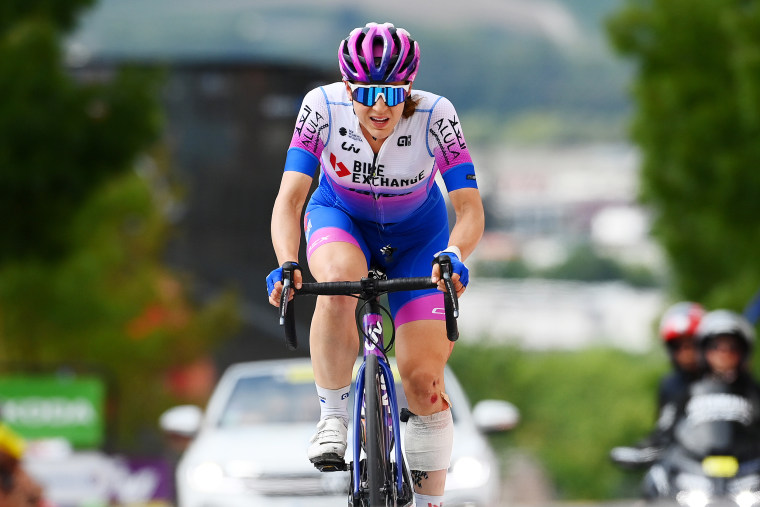
U.S. Olympian Kristen Faulkner didn’t seriously start riding a bike until 2017 when she needed an outdoor hobby. Shortly after she moved to New York City for a venture capital job, she developed a passion for cycling in her spare time.
“It was kind of my outlet every day to get into Central Park and ride for two hours away from the bustle of the city,” Faulkner told NBC News.
But it didn’t come without some initial growing pains.
“I couldn’t clip in” to the bike, she said. “And I was like, ‘Why is this not working?’ I was starting to get really embarrassed. Finally, we realized I just had incompatible cleats and pedals.”
Nadal, Wozniacki, Wawrinka and Monfils all on court today
Some of the biggest, veteran names of tennis will be on the Roland-Garros clay today in hopes of rekindling past magic.
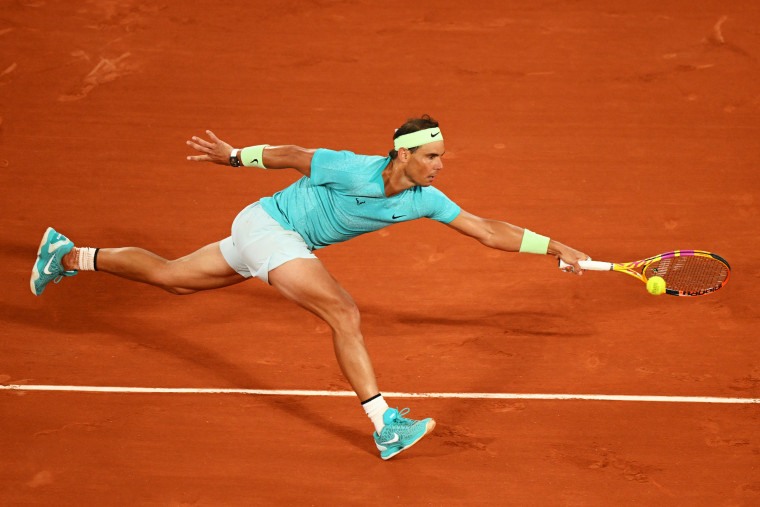
Paris 2024 has attracted some of the sport’s biggest contemporary names, such as Carlos Alcaraz, Novak Djokovic, Iga Swiatek and Coco Gauff. But this tournament isn’t a top priority for many players because it’s not a Grand Slam. That opens the door to some high-profile players in the twilight of their career.
Action began at noon local time 7:00 a.m. ET with 22-time major winner Rafael Nadal, 38, playing the second match at center court against Hungarian Márton Fucsovics.
Stan Wawrinka, 39, and Caroline Wozniacki, 34, are slated to play in the fourth and fifth matches slated for Court Simonne-Mathieu, while French favorite Gaël Monfils, 37, is set for the day’s fourth match on Court Suzanne-Lenglen.
USA Gymnastics coach concerned about Biles’ ankle
Chellsie Memmel, the technincal lead coach on the gymnastics squad, spoke after Team USA raced to the top of rankings. But the joyous mood was tempered by apprehension over Simone Biles’ taped left ankle.
“I haven’t even got to speak to Simone. I need to speak with our team, our medical team, but I don’t have an answer about that. I just first and foremost, I just want to make sure she’s physically okay,” Memmel said, saying she was concerned.
That’s it for U.S. women’s gymnastics
At the Bercy Arena, Team USA’s day is done. Simone Biles’ biggest rival in the all-around, Rebeca Andrade, will compete later today.
Team USA’s expected finalists
There are still three more subdivisions in this qualification round, but the U.S. women are on track to have representatives in each event final.
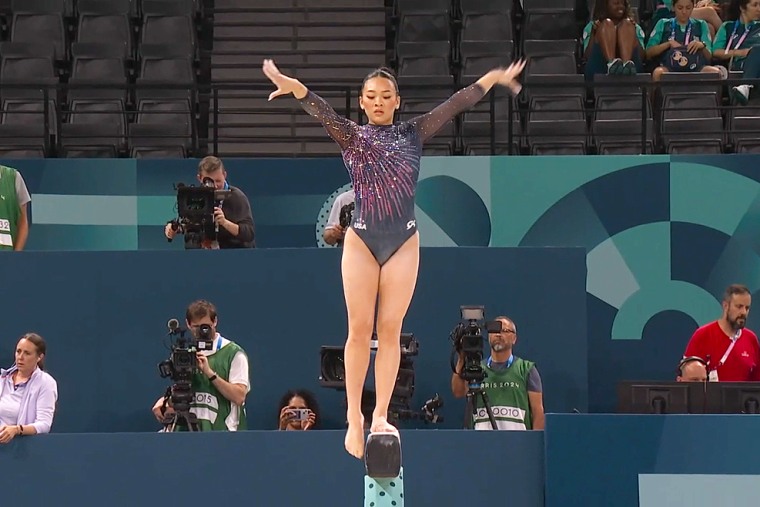
Simone Biles is currently in eighth on bars, so her place there isn’t guaranteed, but it’s unlikely that anyone bumps Suni Lee out of the final. The all-around, vault, beam and floor finalists are in secure positions.
All-Around: Simone Biles and Suni Lee
Vault: Simone Biles and Jade Carey
Bars: Suni Lee and Simone Biles
Beam: Simone Biles and Suni Lee
Floor: Simone Biles and Jordan Chiles
Team USA cruises to first
As expected, the U.S. women dominated the qualification round. After the second of five subdivisions, they scored a 172.296, which is more than five points over Italy, China and Great Britain.
No other teams have the difficulty required to match that, so Team USA is expected to enter Tuesday’s team final in first.
Two all-around champs to face off
For the first time, two Olympic all-around champions will go head-to-head in the all-around final – and they’re both from the same country.
Simone Biles (2016) and Sunisa Lee (2020) will make history regardless of where they finish in Thursday’s final.
Lee does it by a tenth!
By less than a tenth, Sunisa Lee will overtake Jordan Chiles in the all-around standings.
Due to the two-per-country rule, Simone Biles and Lee will be the U.S. representatives in the all-around final. Both are Olympic all-around champions.
Lee did a slightly more conservative routine, taking out one difficult connection and earning a 14.866. That will put her on track to make the bars final as well.
Biles tops the all-around standings
She did not debut her new skill on bars today, but Biles did a stellar routine, earning a 14.433.
That will bring her to a 59.566 in the all-around and she is now in first place in the current standings. It is likely to stay that way.
Biles’ all-around score is best in this cycle
Simone Biles scored 59.566 in qualifying, a score that would have won the last two world championships.
According to the Gymternet website, it is the world’s best all-around score in international competition in this Olympic cycle. Biles has scored higher domestically.
Chiles makes it tough for Lee
A hit uneven bars routine from Jordan Chiles means that Sunisa Lee will have to fight for her chance to defend her medal. She will need a 14.800 to beat Chiles.
But first, Simone Biles on bars.
Rivera does her job on bars
Her beam routine left a little to be desired, but Hezly Rivera will be much happier with a 13.900 on bars. Rivera’s day is now done and the 16-year-old’s Olympic debut is off to a great start.
A Lee and Chiles showdown brewing
The U.S. women are well on their way to qualifying for every gymnastics event final, including the team final. As they prepare to close out this qualification round on bars, a tight race is emerging between Sunisa Lee and Jordan Chiles.
The two are currently within a point of each other and their performances on bars will determine who advances to the all-around final. Simone Biles is the overwhelming favorite to qualify in first place, but Lee and Chiles will battle it out for the second U.S. spot.
Lee, who has a higher starting value on bars, has the edge to defend her all-around title, but she must stay on.
Biles nails the ‘Biles II’
Her warmup was a nail-biter, but Biles turned it on when it mattered. A 15.800 for her eponymous vault will almost certainly be the highest score we see all day.
Biles is displaying incredible fortitude here; performing that vault on an ankle that may be bothering her is no easy feat.
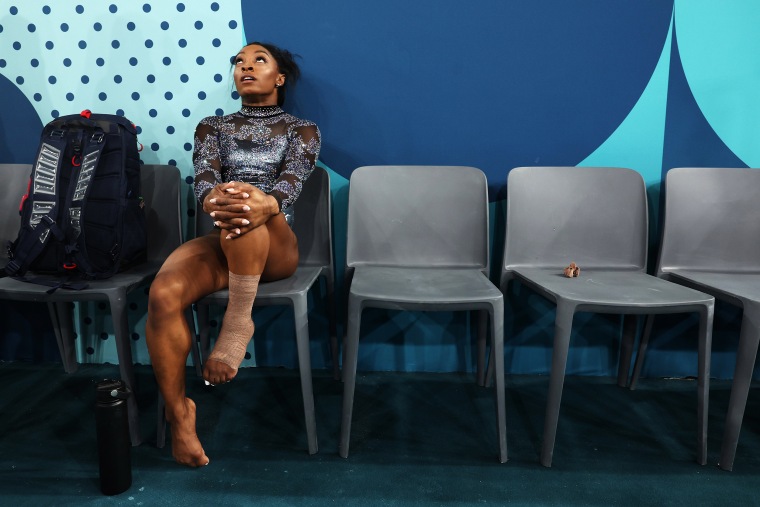
Her first vault score will count toward her all-around total. Her second vault, a Cheng, scored a 14.800. A 15.300 average will easily put her on track to make the vault final, along with her teammate, Jade Carey.
Carey redeems herself on vault
Although Jade Carey’s devastating floor score will prevent her from defending her gold medal, she is on pace to contend for a vault medal.
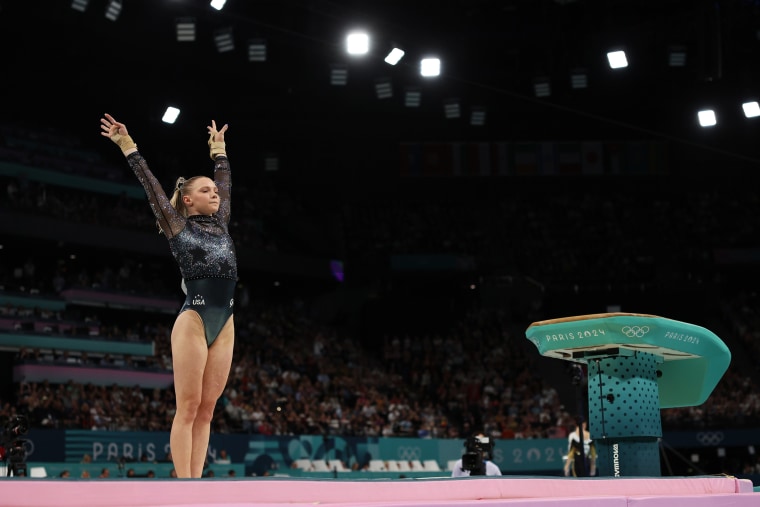
She earned a 14.433 average with a Cheng and a double-twisting Yurchenko. Carey is capable of adding a half twist to the second vault, which we may see in the final
That will outscore Jordan Chiles. Simone Biles, who is arguably the best vaulter in the world along with Brazil’s Rebeca Andrade, is up next.
Chiles makes her case for vault final
To qualify for a vault final, gymnasts must perform two vaults from two different “families,” which means they must do contrasting skills onto the table. Jordan Chiles did a double-twisting Yurchenko and a Lopez, averaging a 14.216.
Chiles is one of three U.S. gymnasts who will attempt two vaults, along with Jade Carey and Simone Biles. They are all capable of making the final, but again, only the top two Americans will qualify.
The best is yet to come for Lee
Vault is not Sunisa Lee’s strongest event, but she cruised though it with a clean double-twisting Yurchenko. A 14.133 is a great score for Lee.
She’ll wrap up her competition on her best event, the uneven bars.
Biles in good spirits despite some limping
While preparing to compete on vault, Simone Biles began to limp and hop on one foot down the runway. She landed short on a warmup of her “Biles II” vault, but appears to be all smiles despite the difficulties.
Because her eponymous vault is quite dangerous and short landings can put stress on her ankle, she will prefer to over-rotate rather than under-rotate it.
That’s why Biles is the GOAT
Simone Biles has the most difficult floor routine in the floor and she executed it with unmatched finesse.
Despite getting her ankle taped after her one-touch warm up, she earned a 14.600. She and her training mate, Jordan Chiles, are on track to make the floor final.
Luckily, Team USA will be able to drop Jade Carey’s 10.633.
Big miss for Carey
The reigning Olympic floor champion will not defend her title.
Despite a strong start to her routine, Jade Carey’s last tumbling pass ended in heartbreak. She appeared to get lost in the air on her double tuck, doing only a full tuck and rolling back out of bounds.
A 10.633 will take her out of contention, but she still has vault ahead.
Chiles dances to her ‘hype-woman’ Beyoncé
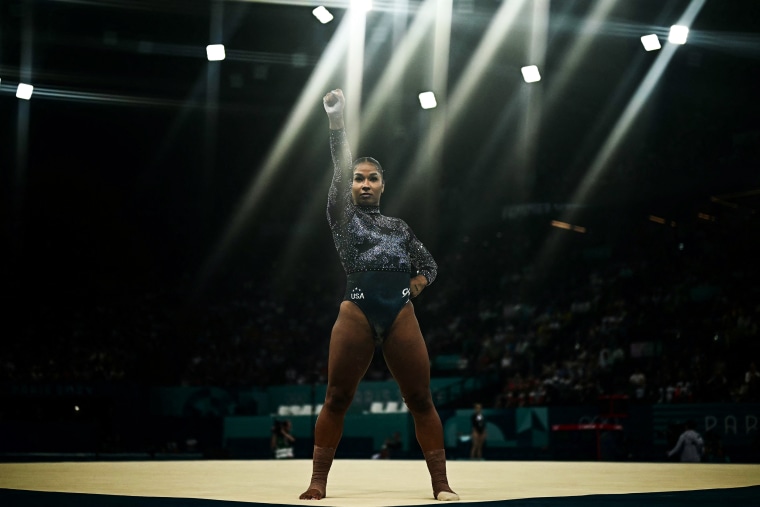
Chiles delivered on floor and earned a 13.866. That’s higher than Lee’s score, but we’ll see what reigning floor champion Carey can do.
Biles gets her ankle taped
While her teammates got the second rotation started, Biles got her left ankle wrapped. She will go last on floor, so she has some down time.
Lee maintains momentum on floor
She went out of bounds on her last pass, a double tuck, but Lee will take that.
A score of 13.100 will keep the reigning all-around champ in the all-around race.
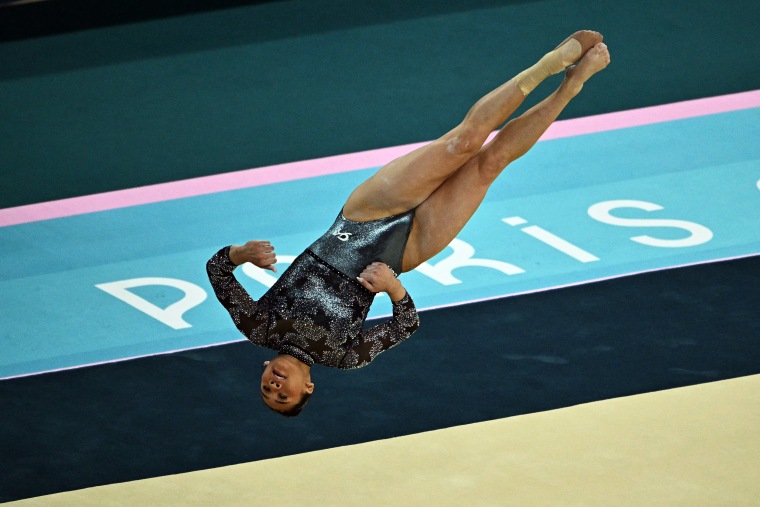
Biles being looked at by a trainer
After her beam routine, Biles consulted the team’s athletic trainer. The next event is floor, which is the most physically taxing of the four.
Biles flirts with perfection in Olympic return

Simone Biles anchored the U.S. beam effort with a near-flawless routine and not a wobble in sight. She earned a huge 14.733 and will expect to join Sunisa Lee in the beam finals.
That’s one of the best routines she has ever done in competition.
Lee stuns on beam
Despite a rough podium training on the event, Sunisa Lee delivers a stunning beam routine when it counts. She opted for an easier mount, doing only a straddle mount instead of her risky layout, step-out.
Lee is in an excellent position to make beam finals with a 14.033.
Hezly Rivera is officially an Olympian
It wasn’t perfect, but Rivera stayed on the beam in her first Olympic routine. A 12.633 isn’t likely to get her into the final, but the U.S. can drop that score.
Their best beam workers, Lee and Biles, are up next.
Solid start from Jordan Chiles
Chiles was a steady lead-off for the U.S., earning a 13.600 on beam despite a few balance checks.
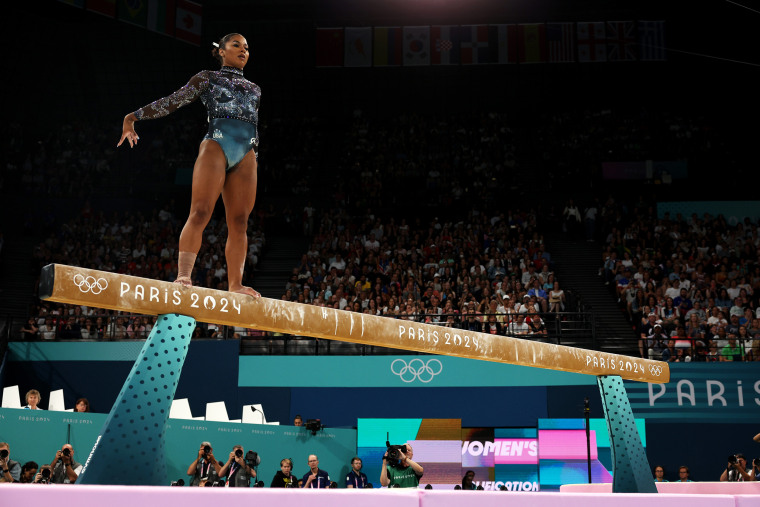
Stars come out for women’s gymnasts
The U.S. women’s gymnastic team has drawn a galaxy of stars who’ve come to watch from the bleachers. Tom Cruise stopped to take selfies with fans, while Lady Gaga and Ariana Grande were also spotted elsewhere in the crowd.
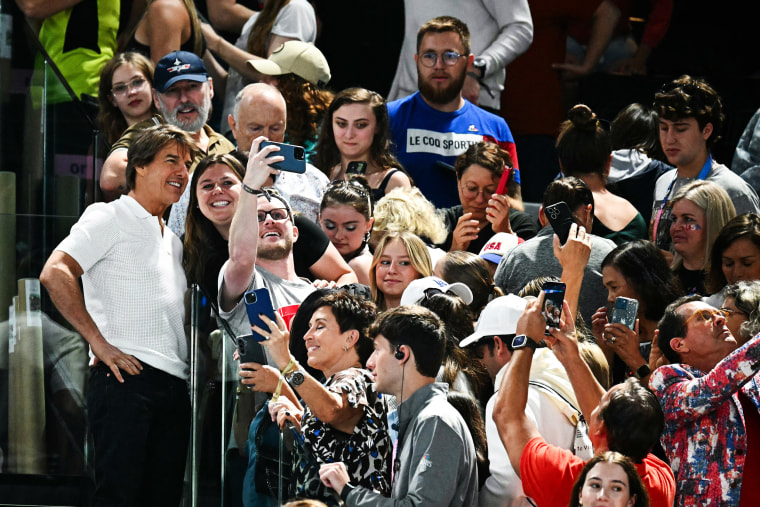
Meanwhile, Anna Wintour has swapped sitting runway-side for the Bercy Arena. She’s joined by director Baz Luhrmann and movie star Jessica Chastain.
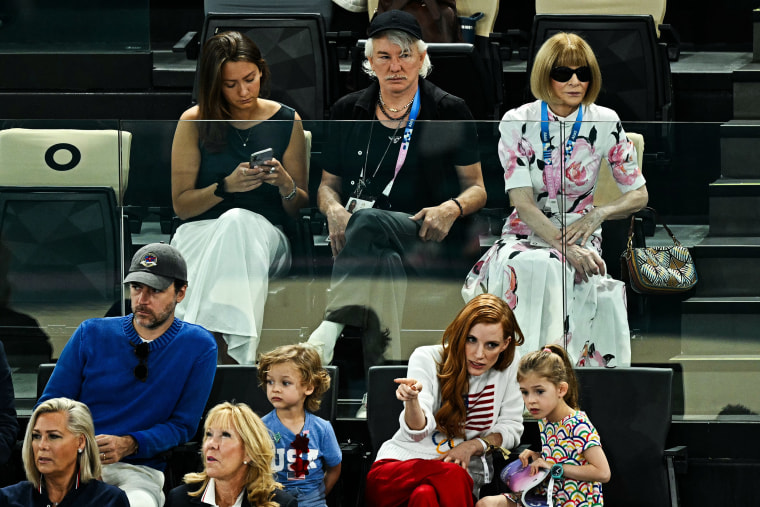
U.S. women’s gymnasts will start on beam
As if the first routines of the Olympics weren’t nerve-wracking enough for Team USA. Simone Biles and company will start their competition on what is probably the most difficult apparatus to settle in on, the balance beam.
Subdivisions and rotation orders are determined by random draw. In the team final, order is determined by qualifying rank.
Another way Simone Biles could make history today
One thing to watch for with Simone Biles this morning is if she performs an unprecedented skill on uneven bars that would mean it gets named after her in the sport’s code of points.
If she performs it, she will become the first gymnast to have a skill named after them on every apparatus in the current Code of Points
What are U.S. women’s gymnasts hoping for?
In just a few minutes, Simone Biles, Suni Lee and Jordan Chiles will battle for spots in both the all-around women’s gymnastics final and the individual apparatus finals.
When qualifying rounds get underway at 5:40 a.m. ET, Jade Carey also will be aiming to make the floor and vault finals. Hezly Rivera, meanwhile, could qualify for beam if one of her veteran teammates makes a mistake.
Overall, Team USA’s women are expected to sail through to the team final in the top spot and will be able to drop the lowest qualifying score on each apparatus.
Team USA falls to Chinese Taipei in women’s team archery
Team USA have been eliminated from the women’s team archery competition after suffering a 5-1 defeat to Chinese Taipei (better known as Taiwan) in the Round of 16.
Featuring world no. 1 Casey Kaufhold alongside Catalina GNoreiga and Jennifer Mucino, Team USA were seen as an outside bet for a medal in this event, but were comfortably outshot in this contest.
Kaufhold’s focus will now switch to the individual event, where she is looking to become the first American woman to win an individual archery medal at the Olympics since 1976. On Thursday, she qualified as the fourth seed in the ranking round ahead of the formal start of the individual competition on Tuesday.
What time does Simone Biles compete?
Qualification for the U.S. women’s gymnastics team takes place today. The U.S., as favorites for the team gold medal, will hope to qualify in first place as a team and have two all-around finalists, as well as a slew of individual event finalists.
The U.S. team, helmed by Simone Biles, competes in Subdivision 2, which occurs bright and early for U.S. viewers at 5:40 a.m. ET.
China takes first gold medal of Day 2
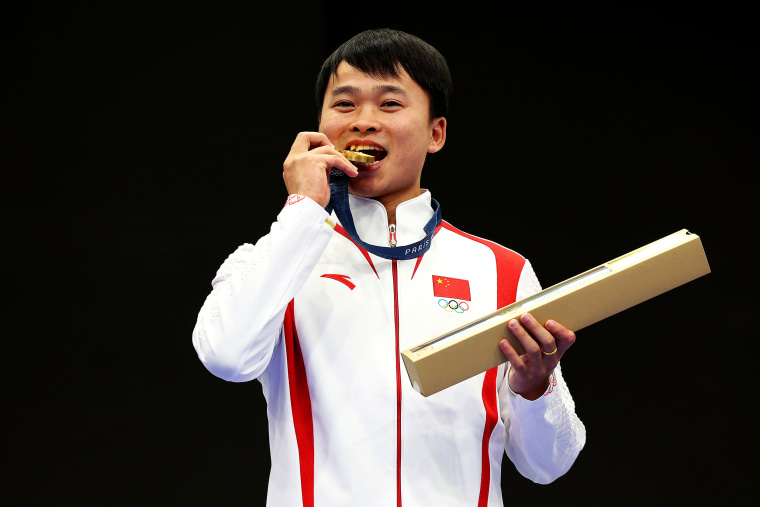
Much like yesterday, the first gold medal of the day has been won in shooting by China.
Xie Yu took gold in the 10m men’s air pistol event this morning, with Italy taking both silver and bronze.
Triathlon practice swim cancelled due to Seine water quality
Much has been made of the water quality of the River Seine in the build-up to the Games, with Paris Mayor Anne Hidalgo taking a dip herself to prove the water is safe.
However, after two days of heavy rain in the French capital, the Seine failed water quality tests, and organizers have been forced to call off the familiarization swim for the triathletes.

“Paris 2024 and World Triathlon reiterates that the priority is the health of the athletes,” organizers said in a statement, but went on to express optimism. “Given the weather forecast for the next 48 hours, Paris 2024 and World Triathlon are confident that water quality will return to below limits before the start for of the triathlon competitions.”
However, if the Seine fails to meet standards, then the triathlon will likely be delayed by a few days to see if conditions improve. If the Seine still doesn’t meet World Triathlon standards, then the event would become a duathlon, scrapping the swim.
The men’s triathlon is due to happen on Tuesday with the women’s following a day later.
Day 2 is underway, and there are blue skies in Paris!
After two days of constant rain, we finally have blue skies in Paris as Day 2 of the Games gets underway with 13 sets of medals set to be awarded Sunday.
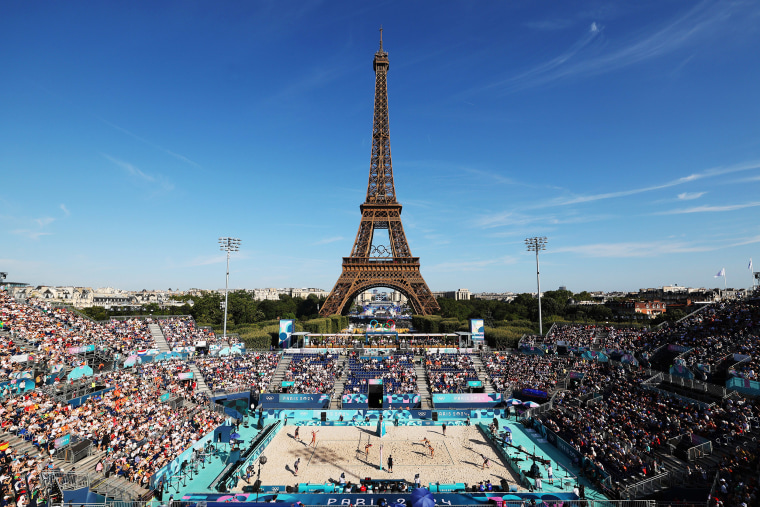
Already this morning we’ve seen the beach volleyball prelims, now basking in the sunshine, continue under the shadow of the Eiffel Tower, while the women’s gymnastics qualifiers are also underway — Simone Biles and Team USA are due up in the second grouping of the day at 5:40 a.m. ET (11:40 a.m. local time).
Sports seeing their first action of the Games Sunday include sailing and skateboarding, and tonight’s swimming finals are set to be headlined by France’s poster boy Leon Marchand, who will be looking to end the host’s 12-year gold medal drought in the pool, and Team USA Gretchen Walsh, who has qualified fastest in the women’s 100m butterfly.
Have you noticed the French tradition brought to the Games?
You may have spotted before the start of a session at the Olympics an unusual ritual of someone banging a stick on the ground. Why is that?
It’s a tradition that originates in classical French theatre called “les trois coups,” or the three blows in English.
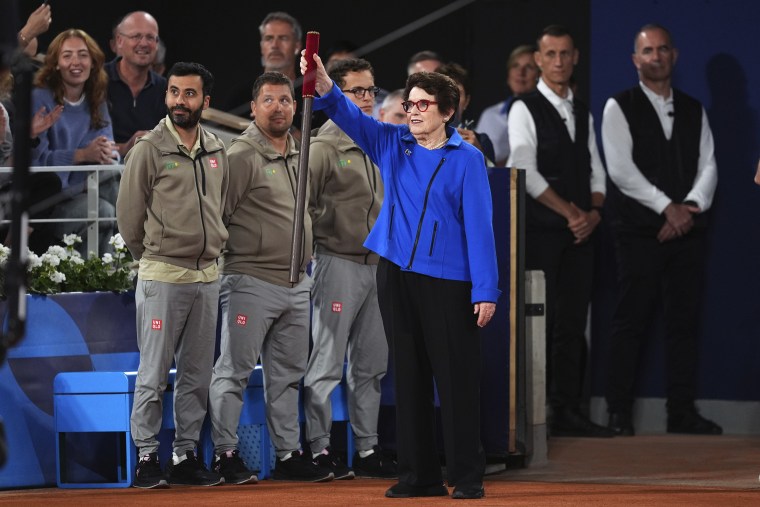
A carved wooden baton, called a brigadier, is tapped on the ground three times to grab the audience’s attention for the rising of the curtain and allows the crowd to prepare for the show that is about to come.
The custom has translated over to the Games with prominent former athletes, officials and volunteers given the honor of giving the three blows before the start of a session. At Roland Garros last night, American tennis icon Billie Jean King got the evening tennis session underway with les trois coups.
What is the two-per-country rule?
In gymnastics, only the top two finishers from each country can qualify to individual finals such as the all-around and apparatus finals.
Longtime Olympic fans may recall the dramatic qualification round from the London 2012 Olympics, when reigning world all-around champion Jordyn Wieber was eliminated from the Olympic all-around final because she was outscored by her teammates, Gabby Douglas and Aly Raisman.
Wieber technically qualified in fourth, but the two-per-country rule took her out of contention. Biles, Lee or Chiles could face similar heartbreak today.
How to watch
Stakes are high in women’s gymnastics qualifications
Although no medals will be awarded in the qualification round, mistakes made in today’s competition have the power to devastate Olympic dreams.
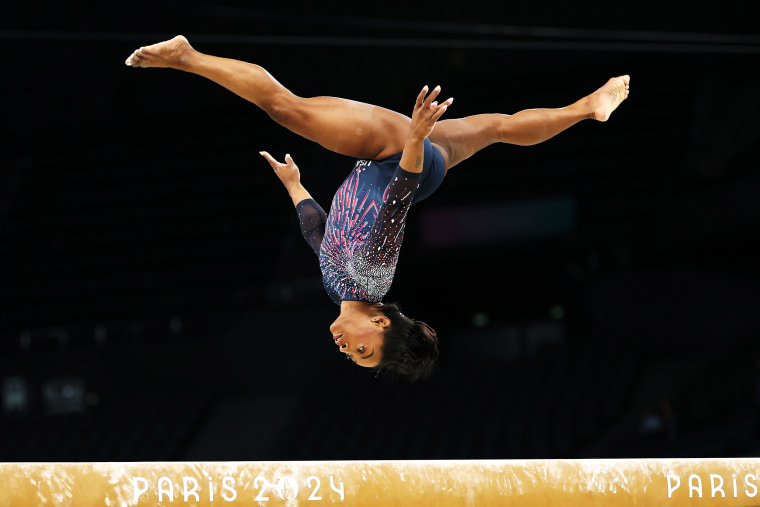
The top eight teams will move onto Tuesday’s women’s team final and the top eight individual finishers on each event advance to the apparatus finals. In the individual all-around, the top 24 finishers qualify to the finals.
Because one bad qualification routine could take a gymnast out of the all-around, apparatus or even team finals, an ill-timed error in this round of competition tends to produce a ripple effect of heartbreak.
Gymnastics scoring 101
Scoring in gymnastics has changed significantly since the days of Nadia Comăneci and her illustrious “Perfect 10.” The current scoring system can seem less intuitive than the previous one to audiences who do not follow the sport between the Olympic Games.
The Perfect 10 still exists in gymnastics, but it is no longer the only metric used to calculate a score. Today’s gymnasts receive scores in two separate categories for each routine: difficulty and execution. The difficulty score is open-ended, while execution is scored out of a 10.00.
The difficulty and execution scores are combined to produce the final number. To optimize their scores, gymnasts perform the most difficult routines they can while minimizing execution deductions.
Here’s an in-depth guide to gymnastics scoring and what makes Simone Biles so good.
USA Fencing phenom makes Olympic debut in individual foil
Lauren Scruggs is up for the USA in the women’s individual foil table of 32. She will be competing against Singapore’s Amita Berthier.
Scruggs is one of two Black U.S. fencers — male or female — to win an individual title.
This is Scruggs’ Olympic debut. She won bronze at the 2024 Washington, D.C., Grand Prix, qualifying her for the Olympics. A rising senior at Harvard, she is the 2023 NCAA foil champion and the 2024 foil runner-up, losing to her Harvard teammate, Canada’s Jessica Guo.
Guo is up against Chile’s Arantza Inostroza in this round.
Also competing in the individual foil table of 32 are the USA’s Lee Kiefer and Jacqueline Dubrovich.
Russian gymnasts won’t defend their Tokyo title
The Russian women’s gymnastics team, who are the reigning Olympic champions, will not compete in the Paris Games due to the ongoing war in Ukraine.
That leaves the team medal podium wide open for teams like the U.S., China, Brazil and Italy.
Swimmer Léon Marchand’s cold call email could end in homegrown Olympic glory
Former Arizona State University swimming coach Bob Bowman might have spiked a random email that showed up in his inbox four years ago if the sender’s name hadn’t rung a bell.
Marchand?
“Thinking back when I first got that email, the first thing I thought was, ‘Marchand? Xavier Marchand?’” Bowman said recently of his prized pupil, Léon Marchand, and his father, Xavier Marchand, a two-time French Olympic swimmer. “I thought about his dad. I wonder if they are related and they were, of course.”

Bowman, best known as the coach of all-time swimming great Michael Phelps, did some quick research to find out who this young, emailing stranger was.
Soccer highlights: USWNT’s Naomi Girma shines on the pitch
Meet Naomi Girma, the first ever player of Ethiopian descent to play for the USWNT. You’ll see her playing defense on the Paris pitch.
“I feel really optimistic for this group and how quickly we can learn and adapt,” Girma, 24, told NBC News.
When she was growing up, she said her Ethiopian father, who loves soccer, started a soccer club for Ethiopian kids in the Bay Area “to come together and play.”
She said winning the gold would mean a lot “not just to me, but to my family, my community.”
“I just feel like I’ve had a lot of people supporting me, backing me along the way,” she said, “and I wouldn’t be here without them so I think it would just be an incredible feeling for all of us.”
What are the different types of fencing swords?
Fencing uses three different weapons: epee (or épée), foil, and saber. While they share a lot of basic rules, differences between their shapes and target areas change the speeds and styles of fencing matches. If you’re new to the sport, here’s a breakdown of the three weapon types:
- Foil is the smallest and most lightweight weapon. Foil fencers also target the smallest area — the torso — using only the tip of the blade. Scoring is largely based on how the point was made correctly, so you might think of foil as the most technical of the three.
- Epee uses only the blade’s point like foil does, but is a much larger and heavier weapon. The whole body is a valid target — the goal is to hit and not get yourself hit. Fencers must carefully choose their moments to strike while positioning themselves strategically, before they jump into action to get a “touch,” or a valid hit.
- Saber hits not only with the tip but also the edge of the weapon, in a slashing motion, that targets everything from the waist up, including the head. These matches are usually the fastest, involving swift exchanges of movement and rigorous footwork.
In foil and saber, there’s a “right of way” rule that doesn’t apply in epee. Whoever begins an attack first takes the right of way and only that fencer may score. If both players hit at the same time, it’s up to the referees to decide who initiated the move.
There is no definitive “most difficult” or “best” weapon, though every fencer has their preference. Foil is often used as an introductory weapon to teach blade control and right of way, but that doesn’t make it any easier to strategize against your opponent.
Lydia Jacoby thought an Olympic gold medal would change her life. It did — but in unexpected ways.
U.S. Olympic swimmer Lydia Jacoby was on top of the world.
At the 2020 Tokyo Olympic Games, she won the gold medal in the 100-meter breaststroke after having recorded the fastest time ever achieved by a female American swimmer (1:04.95).
But shortly after she returned home to Alaska, Jacoby, then 17, discovered in real time how her life had changed from being an obscure athlete to being famous worldwide.
In a conversation on NBC’s “My New Favorite Olympian” podcast, Jacoby detailed the challenges of experiencing depression.












